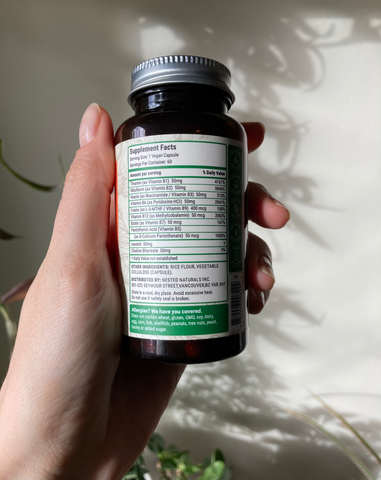Why Do We Need Fillers in Supplements?

As a responsible and health-savvy individual, you probably spend a fair amount of your time reading and understanding product labels before buying any vitamins or supplements. After all, it’s important to be aware of each and every ingredient that you’re putting into your body.
But while the focus of your attention is probably on the active ingredients and other pertinent health information – has there ever been a time when you glanced at the bottom of the label and wondered: “Okay, what exactly are ‘Other Ingredients’?”
So, what are “Other Ingredients”?
Most of the extra stuff listed under “Other Ingredients” are also known as excipients – inactive ingredients which are added to supplements to help with manufacturing and stabilization. Sometimes, the ingredients that are used to make the capsule are also included here (such as gelatin, vegetable cellulose, etc).

A functional supplement needs excipients and fillers. Often the active component of a vitamin or supplement cannot be made into a tablet or capsule form without a stabilizing agent to help keep it active.
Excipients usually don’t contribute any form of nutritional value or influence, and the type that is used in each supplement depends largely on the objective. There are many different types of excipients – such as fillers, binders, flow agents, acidulants and others.
Why do we need excipients in supplements?
Excipients are a necessary part of supplement manufacturing. They are the “glue” which binds and stabilizes a supplement so that it can be taken in various dosage forms.
A functional supplement needs excipients and fillers, because often the active component of a vitamin or supplement cannot be made into a tablet or capsule form without a stabilizing agent to help keep it active.
Here’s a quick breakdown of the different types of excipients and how they are used in supplements:
Fillers
Also known as diluents or carriers, fillers are mainly used as bulking agents, to add substance so that the size of a capsule or tablet is filled to the correct proportions. This helps make very small active ingredients easier for people to consume.
Trace and micro ingredients – like chromium, selenium, iodine, folic acid and biotin – are measured by micrograms, and can be very difficult to detect with the naked eye. Even if portioned into the tiniest of capsules available, without fillers, the capsule would appear to be virtually empty.
That’s why some supplement manufacturers use fillers to make dosage forms a reasonable size. Common fillers include starch, calcium, salts and sugars like lactose.
Binders

Binders are used to hold the ingredients in a supplement together. Without binders, tablets and pressed supplements would easily break apart, chip, crack or crumble.
As the name implies, binders are used to hold the ingredients in a supplement together. Without binders, tablets and pressed supplements would easily break apart, chip, crack or crumble.
Binders are also used to add volume to low active dose tablets. Most binders are usually sugar derivatives, but some are made of cellulose, a simple wood pulp derivative which comes from vegetarian sources and becomes a non-digestible fiber when consumed.
Flow agents
Flow agents are ingredients which are added to supplements in order to help make the manufacturing process more efficient. These usually consist of powder excipients like non-toxic lubricants and anti-caking agents which are used to help tablets and capsules flow through processing steps with minimal resistance.
While flow agents are not strictly necessary, some supplements cannot be made without them. However, they are usually kept at low levels (less than 1% in a blend).
Flow agents also help in the following ways:
- They help ensure the right amount of active ingredients gets in each capsule, thereby assuring quality control.

Flow agents are used in supplements ensure the right amount of active ingredients gets in each capsule, thereby assuring quality control. They serve as densifiers, helping particles stick together resulting in smaller capsules to swallow.
- They allow tablets to be punched and ejected without sticking to the equipment, which results in products of much higher physical quality.
- They serve as densifiers, helping particles stick together. This results in smaller capsules or tablets.
- Overall, they help to keep the cost of manufacturing supplements down, makes supplements more affordable for consumers.
Acidulates
Acidulants are only used for liquid supplements – especially those containing water, which tends to be an ideal environment for microbial growth. Acidulants are used to prevent unwanted bacteria from forming.
Most acidulants are safe for human consumption and are typically found in fruits and vegetables. They include citric acid, malic acid, tartaric acid and aspartic acid.
Disintegrates
If a supplement has the word “fast-acting” on the label, there’s a good chance that it contains disintegrants.
Disintegrants allow for rapid breakdown of capsules or tablets in your digestive tract, so that the active ingredients within can be quickly released and absorbed into your body. These excipients are formulated to instantly dissolve upon contact with water or other liquids.
Our approach
We’re serious about ensuring the quality of each of our products, which is why we always source for the best raw materials and ingredients available – including excipients and fillers. Based on the raw ingredients contained in each product, we strive to make the best choices we can, and do whatever it takes to make our supplements usable and functional.

We also believe in “open book” transparency, and that you deserve to know everything that goes into your body. Not all supplement companies list inactive ingredients on their product labels – but all Nested Naturals supplement labels disclose everything that can be found inside the bottle, including the ingredients used to make and fill our capsules.
Most excipients make up a very miniscule percentage of the ingredients in a supplement (< 1%), and usually pose little to no health risks to those who consume them. In fact, excipients play an important role in ensuring the quality and efficacy of vitamins and supplements, so you can rest assured that they actually improve (rather than detract from) the finished product.
Sources:
ND Health Facts
Science Based Medicine



